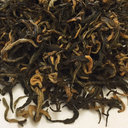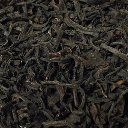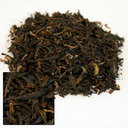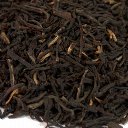Nepal Organic Gold Pathivara Black Tea
 |
|
Commercial Description
...large black and golden well formed leaves that brew to an amber cup with a delicate yet full flavored taste. The astringency that is found in many high-grown Himalayan teas is present in the cup although it is slight. The taste is smooth with a slightly sweet rose taste...
Ratings & Reviews
Page 1 of 1 page with 1 review
 99 Aroma: 10/10 Flavor: 5/5 Value: 5/5
99 Aroma: 10/10 Flavor: 5/5 Value: 5/5Alex Zorach (1453 reviews) on Oct. 31st, 2018
Without a doubt my favorite tea I've ever tried from Nepal. A singular tea with an intoxicating floral fragrance and an ethereal quality overall. Another sample from Simpson & Vail, thank you, and apologies for taking so long to post this one!
This tea was fascinating: visually, the leaf looks more like a Chinese tea, with curled leaf, fully intact, and an abundance of golden-orange tips. The fragrance, however, is more like that of a tea from Nepal or Darjeeling, but it's a bit singular: light, vegetal and sweet, with a strong floral fragrance, and a hint of a spicy peppery note reminiscent of Yunnan teas. I had no idea what to expect before brewing.
The brewed cup had an intoxicating floral aroma, smelling intensely of sweet but light floral scents such as orchid or lilac. It was perfumey and a bit like walking into the orchid room of a greenhouse. There were a hint of mushroomy notes (which I was not a fan of) but thankfully these didn't come out much while drinking.
Mouthfeel is unique and perfect...buttery smooth but thick...leaving a light tingling sensation on the palate. Sipping this tea is an experience...and it demands that I sip it slowly. There's a strong astringency mid-sip that keeps me from drinking it too fast. It leaves my tongue feeling dry, yet is so smooth at the start of each sip that it's easy to just keep sipping slowly.
Very sweet...tastes as if honey has been added. I recommend adding nothing to this tea.
I also loved how I felt after drinking this. Many of the ultra-mild, tippy teas from Darjeeling make me a bit jittery, but this one led to a mellow, calm feeling. It seemed only moderately caffeinated, and the calming effect was stronger than normal.
Resteeps very well, unusually well for a tea of such a light character. The second cup had a similar aroma, just as strong, and a slightly thicker mouthfeel up-front (probably owing to me using a longer steep) but less of the mid-sip astringency. It was more oolong-like in character, and a hint of malty notes that didn't come out in the first steep. It still had the honey-like sweetness and the overall character was very similar to the first cup.
This tea was exceptionally expensive, competing in its price range against the best-of-the-best top grade Darjeelings. But I thought it would be worth paying for this. I actually preferred this to most Darjeelings.
I highly recommend this one, and I'd recommend it even to people who normally prefer teas from China or Assam over the high-grown Himalayan teas, as there is something singular about this tea that makes it stand out from the rest and seem more like teas from other regions.
Page 1 of 1 page with 1 review
More Black Tea from from Simpson & Vail

Java Malabar Plantation Black Tea
| Style: | Black Tea |
| Region: | West Java, Indonesia |
| Caffeine: | Caffeinated |
| Leaf: | Loose |
59
4 Ratings




